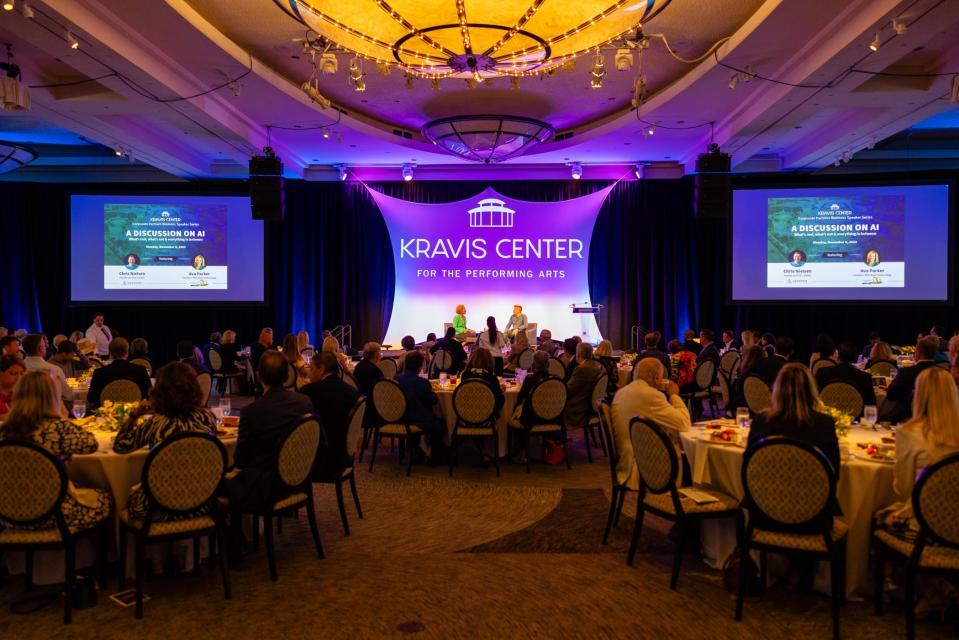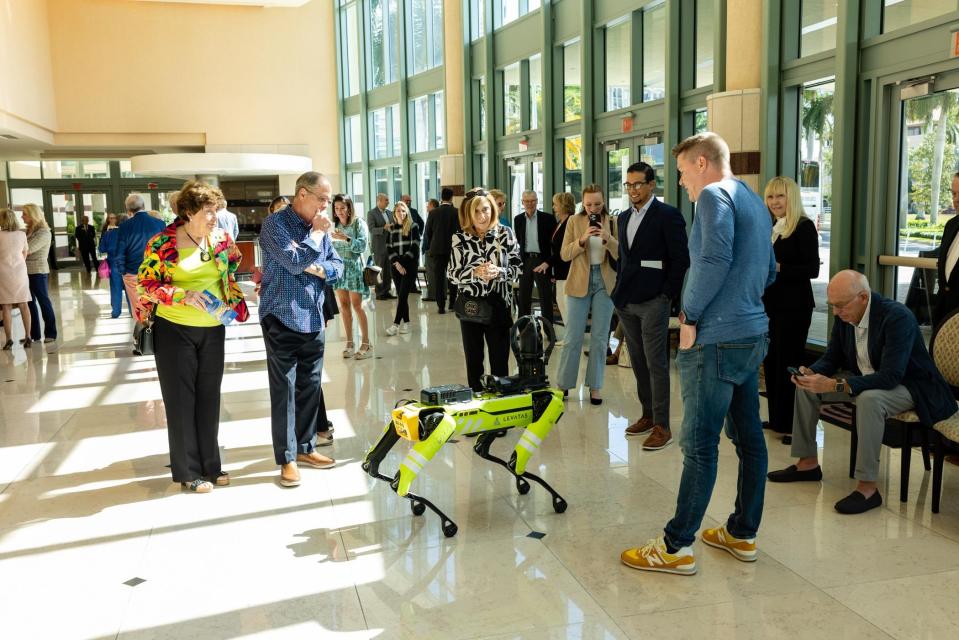The next Industrial Revolution? AI is here to stay, Levatas founder says
A four-legged robot named Spot may have captured much of the attention at the Kravis Center for the Performing Arts in West Palm Beach on Monday, but the real star — granted, one that was invisible — was artificial intelligence.
Advances in artificial intelligence, or AI, and applications for business were the highlight of the first Corporate Partners Business Speaker Series installment of the season featuring Chris Nielsen, founder and CEO of Palm Beach County-based Levatas, in conversation with Palm Beach State College President Ava Parker.
More: Get your tickets: Kravis Center announces details of 31st season
Levatas’ software is what Nielsen called the “brains” of the Spot robot, developed by Boston Dynamics to remove humans from dangerous industrial situations by using Levatas’ AI platform to evaluate things like temperature and pressure gauges. Levatas over the summer announced it would be Boston Dynamics' first certified technology partner.
“That’s a big deal. That’s a big validation for us,” Nielsen said. “You can think of it like we’re the calculator app on the iPhone. You get the iPhone, you don’t have to use the calculator app, but it comes with it. So our business is growing globally, in many ways thanks to that partnership with Boston Dynamics.”

Attendees of the luncheon were dazzled by demonstrations of the Spot robot, which Nielsen said his team named “Sparky.” With a Levatas employee at the controls, Sparky seemed to mingle with guests before the presentation, walking through the crowd gathered in the foyer outside of the Cohen Pavilion’s Gimelstob Ballroom and posing for photos.
More: No joke: Palm Beach Improv gets new home at Kravis Center in West Palm Beach
“AI is coming to the world in a way that’s going to impact everyone in this room,” Nielsen told the Palm Beach Daily News before the presentation. “So I think it’s really important for Levatas, myself being a representative of AI who’s based here in South Florida, to share what we know, to share insights, to kind of preview what to expect.”
Where artificial intelligence used to be something that was only for software companies and “the data science crowd,” it’s now being used in many ways across myriad industries, he said.
Levatas started as a consultancy, helping other companies with their digital transformations. When Levatas built its own artificial intelligence platform a few years ago, the company started to see growth in its current position as a player in the global market.
Past Coverage: Palm Beach Gardens tech firm is U.S. Senate committee's Small Business of the Week
Levatas’ focus is on what Nielsen called “blue collar AI,” industrial uses where humans could be in harm’s way.
Companies including Florida Power & Light Co., BMW and Royal Caribbean now use Levatas’ artificial intelligence platform.
FPL has used the technology for post-storm image analysis, Nielsen said. “We deploy our services, our solutions, to help keep employees safe in dangerous environments,” he said.
The Spot robot uses Levatas’ “cognitive inspection platform” and 16 cameras to scan the world around it, capturing pictures and videos that help the robot look for anything that might be unsafe or not operating properly. Those anomalies might include temperature changes, leak detection and PPE compliance.

The robot has four legs that can move independently to navigate difficult terrain like gravel, grass, rocks and hills, Nielsen said.
Much of Parker's and Nielsen’s conversation focused on the misconceptions and potential regulations faced by artificial intelligence.
Parker said when she mentioned to her 14-year-old son that she was discussing artificial intelligence, he responded, “This AI stuff is crazy” — a comment that elicited sympathetic chuckles from the crowd.
Where some people view AI as a threat, Nielsen said it is better seen as a tool.

“One hundred percent, it’s a misconception that it’s somehow a cheat code,” he said, adding, “We think that’s kind of a flawed way to look at it.”
Instead, in an academic environment like Palm Beach State College, Nielsen said artificial intelligence can be leveraged to help faculty and students.
“If the academic institution’s approach is, ‘AI bad,’ I think we’re going to stunt the growth and future earning potential of our students, of our young people,” Nielsen said.
While some may think that artificial intelligence could replace humans, Nielsen said it is better to view it as an opportunity to remove humans from potentially dangerous situations.
“It’s something that can enhance your team, upskill them, cross-skill them into new domains,” he said.

Nielsen compared advancements in artificial intelligence to the Industrial Revolution, the period during the late 18th and early 19th centuries of profound advancements in technology, industry and factory systems.
When the assembly line was introduced by Henry Ford, there were protests, Nielsen said. The protesters said the assembly line would eliminate the need for factory workers, he said.
“Did it mean that? Of course not,” he said. “It spurred the Industrial Revolution. It made America a superpower. So we believe that those are the stakes to a degree.”
The risky jobs in which Spot can step in are ones humans shouldn’t be doing, Nielsen said. “We’re not replacing humans,” he said. “These are not jobs that we want, and we’re keeping people safe who aren’t asked and required to do these jobs and these tasks. That’s really the purpose. It is worker safety and then productivity gains for our customers.”
In the coming years, there will be a shift toward a need for more technical jobs with “new and different skill sets at an equal or increased pace to the jobs that are being impacted,” Nielsen said.
Outside of industrial uses, there are applications in industries including law and medicine, he said. From researching legal precedent to looking for trends in medical imaging of a patient, artificial intelligence is progressing quickly and helping save time and increase productivity and results, Nielsen said.
“Of course, it doesn’t mean that they’re practicing medicine,” he said of AI programs. “It means that they have the ability to make the physician, the practitioner, way more informed.”
Diane Quinn, CEO of the Kravis Center, said the presentation was especially timely.
“Everyone is talking about AI,” she told the Palm Beach Daily News, noting that many people use it in their everyday lives without even realizing it.
“It’s impacting all of us, but each in a very different way,” Quinn said. “To me, that was the thing that was most compelling about having Chris and Ava here today, because I believe it’s going to touch each person differently.”
Asked by Parker about what he is most excited for in the future of artificial intelligence, Nielsen smiled. “I’ll go the personal track,” he said. His 6-year-old daughter, Heidi, has lissencephaly, a rare condition where a person is born with parts of their brain that are smooth, instead of having ridges and folds.
Because of her condition, Heidi is nonverbal and cannot move, Nielsen said.
“My great hope for AI is to be able to speak to Heidi,” he said. “In all reality, we are headed to a place where in AI, we can interpret signals from brain activity, from brain scans.”
While a doctor now may look at imaging of her brain and see what looks like a permanent seizure, artificial intelligence may be able to find a different interpretation, he said. He also said there is promise for communication in the Neuralink brain interface being developed by a company founded by Elon Musk.
“I’ve got a special story, and I know everybody at every one of these tables has a special story or someone who might be dealing with something that we don’t understand, that AI could help us understand in the achievable foreseeable future,” Nielsen said. “So, this isn’t science fiction. It really is potentially in our lifetime.”
This article originally appeared on Palm Beach Daily News: Boston Dynamics' Spot robot, AI by Levatas at Kravis Center event

